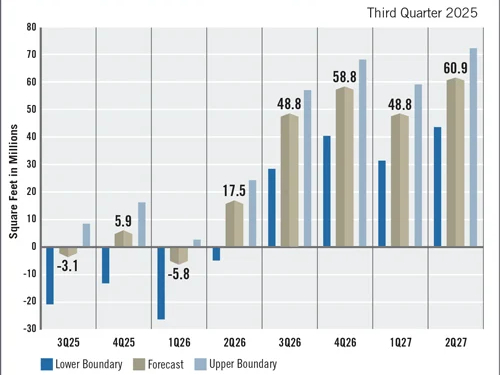Site Selection: Today’s Top Trends
Site selection and location strategy have been mainstays of corporate expansion for a long time. But new trends are shifting the way that analytical and qualitative techniques are applied when determining the optimal location for a business operation.
By Steven Bandolik
 Site selection and location strategy have been mainstays of corporate expansion for a long time. But new trends are shifting the way that analytical and qualitative techniques are applied when determining the optimal location for a business operation.
Site selection and location strategy have been mainstays of corporate expansion for a long time. But new trends are shifting the way that analytical and qualitative techniques are applied when determining the optimal location for a business operation.
A recent webcast by Deloitte Consulting colleagues Darin Buelow and Matt Szuhaj discussed some of the major issues impacting location choice today, including the rapidly shifting political, resource and technology climates; a growing propensity toward a public versus private approach to site evaluation; and even shifting investment trends.
It’s important that executives and teams leading a site selection process understand that few corporate decisions have as many immediate and long-term implications on tax structure, cost of goods sold, supply chain, labor force, culture and overall operating success as the choice of location.
To help navigate the tricky waters of today’s location strategy process, following are the key emerging trends and considerations raised in the webcast.
Macro trends – political and social pressures
There are many macroeconomic factors impacting site selection today—and with each degree of complexity comes a new set of considerations requiring a higher degree of analysis to minimize risk and make the right location decision.
Tax reform is one of several areas in the political arena especially impacting site optimization decisions. Even social issues are weighing on the process, given that consumers are paying more attention to companies’ political decisions. Interestingly, the online poll conducted during the webinar found that executives across industries are most concerned about tax reform and social impact.
Disclosure trends – the public approach versus confidentiality
Increasingly, we are seeing companies announce projects publicly prior to conducting location strategy. There are some pros to going public immediately, such as reinforcing perceptions of transparency throughout the process, opening a competitive lens, and even shortening the timeframe to receive incentive offers. However, there are also negatives to this approach.
Organizations must weigh the decision of a public versus private approach carefully. Project confidentiality is important during the site selection process because it protects owners from unwanted attention and distractions that can influence the outcome of a study, such as premature and out-of-context reactions from stakeholders on Wall Street, competitors, land speculators and even employees who may not have a firm’s best interests in mind. A carefully planned and executed announcement strategy should give a company the best chances of success from political, financial and human resources perspectives.
Investment trends – the Southeast United States
The Southeast has experienced a high inflow of new investments in recent years due to its competitive operating costs, favorable operating environment and attractive incentives. States including Texas, Tennessee and North Carolina have each boasted well over 100 manufacturing investment announcements since 2010, creating tens of thousands of jobs. The graph below illustrates that U.S.-based manufacturing is still alive and that companies are casting a wide net of where they are choosing to deploy operations. When selecting the right geography for an expansion, it’s important for organizations to consider how important market access is to their business—which may push them to locate in the Northeast—or whether factors such as lower operating costs and better tax environments in the Southeast and Midwest align more closely with their location goals.
Steven Bandolik is a managing director with Deloitte Services LP and a senior leader in Deloitte¹s real estate and construction services practice. Bandolik provides advisory services in capital markets (debt and equity), corporate finance, mergers and acquisitions, investments, strategy, restructuring and reorganization, and asset recovery. Bandolik brings more than 30 years of effective, hands-on real estate investment, finance, development, and asset/property management experience, both as a leader and as a strategic advisor.








You must be logged in to post a comment.